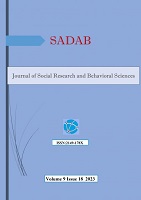Eğitim Kurumu Yöneticilerinin Kayırmacı Tutum ve Davranışlarının Öğretmen Performansına Etkileri
The Effects of Nepotistic Attitudes and Behaviors of Educational Institution Managers on Teacher Performance
Author(s): Ceyda Çakıroğlu, Muzaffer DeliSubject(s): Education, Ethics / Practical Philosophy, State/Government and Education, Organizational Psychology
Published by: SD Yayınevi
Keywords: Educational Institution; Educational Administrator; Teacher; Nepotism;
Summary/Abstract: The purpose of this study, in which the effects of nepotistic attitudes and behaviors of educational institution managers on teacher performance are examined, is to create a reference for those who will conduct research and research on the subject by contributing to the literature. Nepotistic behavior is considered by experts to be a sensitive situation in schools where education and training are applied, as it changes the organizational activities defined as the realization of goals and objectives set by a person. The individuals who direct the activities of educational institutions to achieve their goals and set goals are school administrators. The education manager should always be an example to teachers, a guide who sets the conditions and standards and guides them to achieve the best. Education managers should pay attention to the application of ethical rules inside and outside the school in the process of realizing this. This sensitivity is a responsibility that education managers, rather than subordinates, must fulfill. Because a wrong attitude of the education manager can be legitimized by being considered correct by subordinates. For this reason, it is essential that the education manager adopts ethical values. Otherwise, the education manager will be faced with the problem of unprincipled. This internalization process is under the conscientious responsibility of the education manager. The attitude that education managers will adopt and the decisions they will make can provide trust in the institution or destroy the trust that has been formed. The decisions and practices taken by education managers, as well as their actions that contradict the morals and ethics that they should avoid in their interactions with employees, illegal protection of people and communities within the educational institution, granting and offering special privileges to these people unfairly, corruption and nepotistic attitudes that are encountered. Some researchers have observed that the reason for the nepotistic behavior of educational administrators in educational institutions is most often realized by the educational administrator's motive to control teachers, and under this lies the desire of the educational administrator to maintain his authority. At the same time, they claimed that education managers who have completed their competent and personal maturity do not engage in nepotistic behavior.
Journal: Sosyal Araştırmalar ve Davranış Bilimleri
- Issue Year: 9/2023
- Issue No: 18
- Page Range: 159-173
- Page Count: 15
- Language: Turkish

